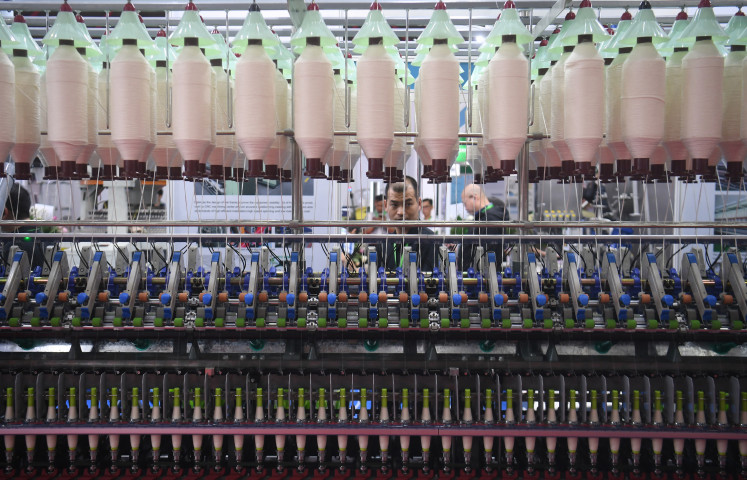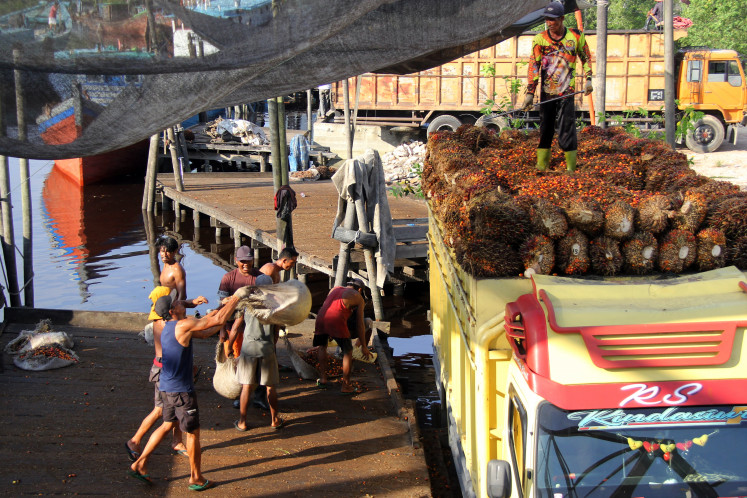Popular Reads
Top Results
Can't find what you're looking for?
View all search resultsPopular Reads
Top Results
Can't find what you're looking for?
View all search resultsPrestige, myths support animal trade
The prestige surrounding collecting preserved animals and myths about the uses of animal parts have been blamed for the continued trade in protected animals and their body parts in West Kalimantan
Change text size
Gift Premium Articles
to Anyone
T
he prestige surrounding collecting preserved animals and myths about the uses of animal parts have been blamed for the continued trade in protected animals and their body parts in West Kalimantan.
Although the local conservation agency claims to have repeatedly disseminated information that such sales are against the law, the trade in body parts from protected animals continues in the province.
As such, accessories and potions made from rare animal body parts can still be found at souvenir shops in a number of regencies in West Kalimantan.
“Such souvenir shops continue to exist in the market because of such prestige and myths,” West Kalimantan Natural Resources Conservation Agency (BKSDA) head Sustyo Iriyono told The Jakarta Post over the weekend.
Providing an example, Sustyo relayed a myth that the liquid made from soaking a baby pangolin in arak (traditional liquor) could improve sexual drive, stamina and cure several diseases.
He said his agency had conducted various familiarization programs informing people that trading protected animals, including preserved body parts, was a violation of Government Regulation No. 8/1999 on the utilization of wild plants and animals.
The Singkawang District Court in West Kalimantan recently sentenced a local souvenir seller to nine months and 10 days in prison and a fine of Rp 50 million (US$3,800) for trading protected animal body parts including three orangutan skulls.
The trader was found guilty of storing and possessing without license the skins, carcasses and other body parts of protected animals.
The skulls of the three orangutans, which are endemic to Kalimantan and Sumatra, were traded as accessories together with two sun bear skulls, two helmeted hornbill beaks and nine deer horns.
The trader was arrested in April during a joint raid conducted by the West Kalimantan Police’s special crimes directorate and the BKSDA.
Other evidence seized in the raid included 111 quills, the bones, fangs and claws of sun bears, a section of pangolin scales, a preserved baby pangolin, a preserved hawksbill and a preserved green turtle carapace.
The trader acquired the items from various regions across Kalimantan.
Singkawang’s Region III Conservation Section head, Agus Arianto, said the evidence would be handed over to the West Kalimantan BKSDA on Friday, while evidence from other cases surrounding drugs and gambling would be destroyed.
Sustyo expressed hopes that the sentence would provide a deterrent effect as there were still many souvenir shops in several regencies across West Kalimantan.
West Kalimantan World Wildlife Fund (WWF) program manager Albertus Tjiu said the sentence was relatively harsh, considering that previously there had never been an orangutan trader sentenced to more than five months in prison.
Earlier this month, two members of a tiger trade syndicate have been sentenced to four years in jail for their attempt to sell the skin of a Sumatran tiger.
The Rengat District Court in Taluk Kuantan, Riau, also ordered each of the defendants to pay Rp 60 million in fines or serve an additional three months behind bars.
One of the convicts, Herman alias Man bin Mausin from Kuantan Mudik district, has long been known as a trader of animal body parts, such as snake skins and lizard skins.
The other convict, Adrizal Rakasiwi alias Adri from Jambi, would often come to Herman’s house and act as a middleman in the sale of animal body parts to buyers in various regions.
The defendants were proven guilty of keeping a piece of Sumatran tiger skin to be sold to a buyer in Jambi, who was still at large.
They had violated Article 21 and 40 of Law No. 5/1990 on the conservation of natural resources and the ecosystem and Article 55 of the Criminal Code (KUHP).
The price of the tiger skin was already agreed at Rp 150 million, but the team from Riau Police and the Riau and Jambi Natural Resource Conservation Agencies arrested both at Herman’s house in April before the transaction could be concluded.










